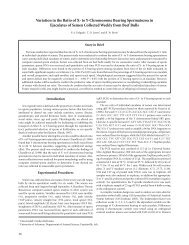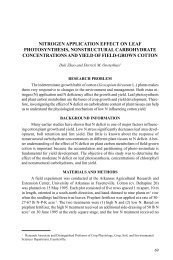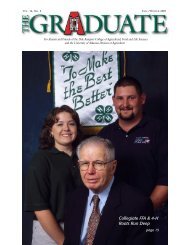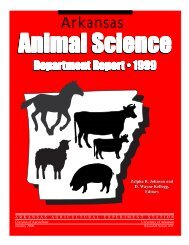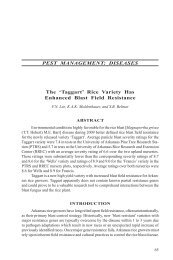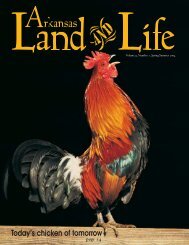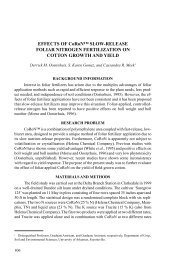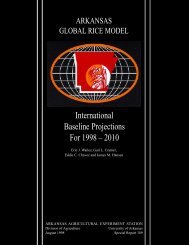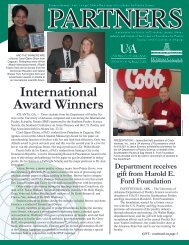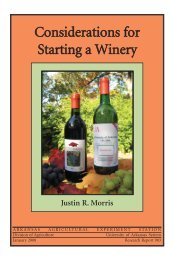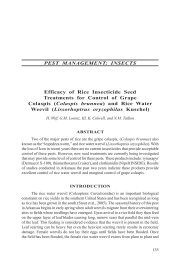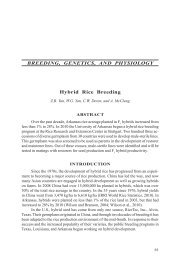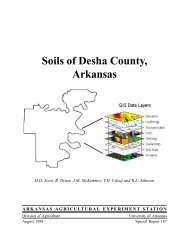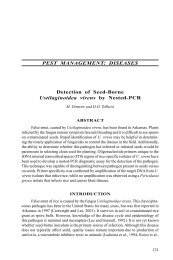Arkansas - Agricultural Communication Services - University of ...
Arkansas - Agricultural Communication Services - University of ...
Arkansas - Agricultural Communication Services - University of ...
Create successful ePaper yourself
Turn your PDF publications into a flip-book with our unique Google optimized e-Paper software.
<strong>Arkansas</strong> Animal Science Department Report 2001<br />
was measured using [ 3 H]thymidine. Triplicate cultures from<br />
each calf with each mitogen were supplemented with 25 ml<br />
<strong>of</strong> fetal bovine serum.<br />
Weights, ADG, and lymphocyte blastogenesis data<br />
were analyzed using the GLM procedure <strong>of</strong> SAS (SAS Inst.<br />
Inc., Cary, NC). The model included block, base supplement,<br />
fish oil and the base supplement by fish oil interaction.<br />
Literature Cited<br />
Hankenson, K. D., et al. 2000. Proc. Soc. Exp. Biol. Med.<br />
223:88<br />
Kris-Etherton, P. M., et al. 2000. Am. J. Clin. Nutr.<br />
71(Suppl.):179S<br />
Theis, F., et al. 1999. J. Anim. Sci. 77:137-147.<br />
Results and Discussion<br />
Fish oil supplementation had a negative impact on ADG<br />
(Table 2) when added to the corn-based supplement and no<br />
effect when added to the wheat midd-based supplement<br />
(base-supplement x fish oil interaction, P < 0.03). This negative<br />
association could have been due to a decreased overall<br />
fiber digestibility due to the added starch and oil.<br />
Isolated lymphocytes (Table 3) from steers fed the<br />
corn-based supplement with fish oil had a greater response to<br />
stimulation with CONA than lymphocytes from calves fed<br />
the corn-based supplement, and there was no effect <strong>of</strong> fish oil<br />
addition to the wheat midd-based supplement (base-supplement<br />
x fish oil interaction, P < 0.01). Isolated lymphocytes<br />
from steers fed the corn based supplement had a greater<br />
response to stimulation with PHA (P < 0.05) and PWM (P <<br />
0.01) than lymphocytes from steers fed the wheat midds<br />
based supplements (base-supplement effect, P < 0.05). Fish<br />
oil supplementation increased the blastogenic response <strong>of</strong><br />
lymphocytes to PHA (P = 0.09) and PWM (P = 0.04) over the<br />
basal supplemented steers. The stimulation in the immune<br />
system was unexpected since in previous studies in humans<br />
and rats it has been shown that fish oil supplementation modulates<br />
and/or decreases the activity <strong>of</strong> the immune system<br />
(Hankenson et al., 2000). Two more trials are currently being<br />
conducted to further elucidate the effects <strong>of</strong> fish oil supplementation<br />
on the immune system <strong>of</strong> cattle as well as to determine<br />
the fatty acid composition <strong>of</strong> the meat.<br />
Implications<br />
This study suggests that supplementing fish oil to grazing<br />
cattle may boost their immune response and therefore aid<br />
in the reduction <strong>of</strong> morbid cattle. However, the depression in<br />
growth may eliminate any additive effects <strong>of</strong> stimulating the<br />
immune system. The determination <strong>of</strong> the effects <strong>of</strong> supplementing<br />
fish oil to grazing cattle on carcass characteristics<br />
has yet to be determined.<br />
Acknowledgements<br />
The authors would like to extend their deepest gratitude<br />
to J. A. Hornsby, G. Carte, and J. Sligar for the management<br />
and care <strong>of</strong> the experimental animals. The authors would also<br />
like to acknowledge Omega Protein for donating the fish oil.<br />
64



